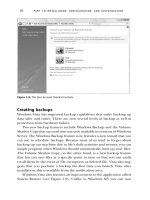The Unofficial Guide to Opening a Franchise potx
Bạn đang xem bản rút gọn của tài liệu. Xem và tải ngay bản đầy đủ của tài liệu tại đây (1.45 MB, 385 trang )
Unofficial
Guide
®
the
to
Opening a
Franchise
Unofficial
Guide
®
the
to
Opening a
Franchise
Jason R. Rich
Copyright © 2007 by Wiley Publishing, Inc., Hoboken, NJ
Published by Wiley, Hoboken, NJ
No part of this publication may be reproduced, stored in a retrieval system or trans-
mitted in any form or by any means, electronic, mechanical, photocopying, record-
ing, scanning or otherwise, except as permitted under Sections 107 or 108 of the
1976 United States Copyright Act, without either the prior written permission of the
Publisher, or authorization through payment of the appropriate per-copy fee to the
Copyright Clearance Center, 222 Rosewood Drive, Danvers, MA 01923, (978)
750-8400, fax (978) 646-8600, or on the web at www.copyright.com. Requests to the
Publisher for permission should be addressed to the Legal Department, Wiley
Publishing, Inc., 10475 Crosspoint Blvd., Indianapolis, IN 46256, (317) 572-3447, fax
(317) 572-4355, or online at />Wiley, the Wiley Publishing logo, Unofficial Guide and all related trademarks, logos,
and trade dress are trademarks or registered trademarks of John Wiley & Sons, Inc.
and/or its affiliates. All other trademarks are the property of their respective owners.
Wiley Publishing, Inc. is not associated with any product or vendor mentioned in this
book.
The publisher and the author make no representations or warranties with respect to
the accuracy or completeness of the contents of this work and specifically disclaim
all warranties, including without limitation warranties of fitness for a particular pur-
pose. No warranty may be created or extended by sales or promotional materials. The
advice and strategies contained herein may not be suitable for every situation. This
work is sold with the understanding that the publisher is not engaged in rendering
legal, accounting, or other professional services. If professional assistance is
required, the services of a competent professional person should be sought. Neither
the publisher nor the author shall be liable for damages arising here from. The fact
that an organization or Website is referred to in this work as a citation and/or a
potential source of further information does not mean that the author or the pub-
lisher endorses the information the organization or Website may provide or recom-
mendations it may make. Further, readers should be aware that Internet Websites
listed in this work may have changed or disappeared between when this work was
written and when it is read.
For general information on our other products and services or to obtain technical sup-
port please contact our Customer Care Department within the U.S. at (800) 762-2974,
outside the U.S. at (317) 572-3993 or fax (317) 572-4002.
Wiley also publishes its books in a variety of electronic formats. Some content that
appears in print may not be available in electronic books. For more information about
Wiley products, please visit our web site at www.wiley.com.
Library of Congress Cataloging-in-Publication Data is available from the publisher.
ISBN: 978-0-470-08951-4
Manufactured in the United States of America
10987654321
Page creation by Wiley Publishing, Inc. Composition Services
Wiley Bicentennial Logo: Richard J. Pacifico
This book is dedicated to everyone with the determination and
dedication to pursue their dreams of becoming franchisees.
I wish you all the best of luck in your endeavors.
Acknowledgements
F
irst, I’d like to thank Pam Mourouzis at Wiley Publishing
for inviting me to work on this project. I am proud to be
able to contribute my fourth book to the Unofficial Guides
series. Also, thanks to Tere Stouffer, my editor on this project,
for all of her hard work and dedication.
I’d also like to thank all of the franchising experts whom I
had the opportunity to interview as I was writing this book. I am
grateful for all of their support on this project.
On a personal note, thanks to my closest and dearest friends,
Mark and Ellen, as well as Sandy, Emily, and Ryan. I’d also like
to give a shout out to my puppy Rusty (www.MyPalRusty.com).
As always, my thoughts and best wishes go out to Ferras.
Contents
vii
About the Author xii
Introduction xiii
I Franchising Basics 1
1 What’s a Franchise, Anyway? 3
Reviewing a brief history of franchising 5
Understanding how franchises work 5
Determining whether you’re a good fit
for a franchise 6
Discovering the biggest misconceptions
about franchises 9
Recognizing the differences between
a franchise and a traditional business 12
Choosing the best franchise for you 15
Just the facts 19
2 Are You Franchisee Material? 21
Do you have what it takes to be a
successful franchisee? 22
What to expect from the experience 31
Just the facts 38
3 Choosing the Right Franchise for You 39
Defining your short-term and long-term
goals 40
Considering your interests 59
Researching franchise opportunities 61
Preparing for your new life as a franchisee 67
Just the facts 68
viii
CONTENTS
4 Franchise Opportunities 69
The latest franchising trends 70
How to learn more 74
A sampling of twenty franchise opportunities 75
Entrepreneur magazine’s top twenty-five franchises
for 2006 95
Just the facts 97
II Before You Open Your Doors 99
5 Lining Up Your Finances 101
Analyzing whether you’re creditworthy 101
Developing a detailed business plan 105
Calculating the total capital needed 106
Financing options for franchisees 111
Keeping the books 117
Just the facts 117
6 Legal Issues Relating to Your Franchise 119
Why you need a franchise attorney 120
Preliminary questions to ask a franchise attorney 122
Understanding the UFOC 124
Making sense of your Franchise Agreement 127
Other legal matters you’ll need to deal with 128
Just the facts 130
7 Choosing Your Location 131
There are many types of locations 132
Analyze your customer base . . . again! 141
Determine whether your targeted customer base is
large enough 142
Figuring out your real estate needs 142
Key points to consider when choosing a location 144
Strategies for negotiating your lease 147
The next step: construction 149
Just the facts 151
ix
CONTENTS
8 The Training You’ll Need 153
Training basics 153
The training you can expect from your franchisor 155
Take advantage of all learning opportunities
available 161
Rounding out your business education 163
Passing on your knowledge to employees 164
Just the facts 164
III Getting Ready for Opening Day 167
9 Hiring and Managing Your Employees 169
Defining your staffing needs 170
Create job titles and descriptions, and then set
expectations 171
How and where to find the best employees 172
Having applicants complete a job application 176
The art of interviewing job applicants 177
Hiring employees you can trust 182
Managing your employees 183
Creating an employee manual 184
Rewarding your employees 184
Setting salaries, benefits, and bonuses 186
Dealing with common staffing problems 187
Firing bad employees 187
Just the facts 188
10 Seeking Business Help from Professionals 191
What constitutes an expert? 192
Determining what types of experts your business
could benefit from 194
Steps for finding and hiring the best experts 204
Obtaining the additional training and education
you need 206
Just the facts 207
x
CONTENTS
11 Working with Suppliers and Vendors 209
Understanding the jargon 210
Following the rules and guidelines of your franchisor 211
Selecting vendors 213
Establishing credit with your vendors 216
Inventory-management techniques 217
Just the facts 218
12 Marketing Your Business Locally 221
Defining marketing, advertising, and PR 222
Promoting and advertising your business 224
Creating an overall plan that works 226
What is marketing? 231
What is public relations? 233
What is advertising? 240
Why becoming active in your community is
important 244
Focus on always providing top-notch customer
service 245
Planning your opening-day events 248
Just the facts 248
IV Gathering Expert Advice 251
13 Getting Insight from Franchising Experts 253
Lawrence J. “Doc” Cohen, CFE 254
Tom Buxton 265
William Killion 270
Just the facts 275
14 Successful Franchisors Reveal Their Secrets
for Success 277
Lynette McKee 279
Stuart Mathis 287
Jeff Schenck 293
Joy Flora 297
Don Slifer 297
xi
CONTENTS
Ken Sully 305
Amy Nichols 312
Just the facts 319
15 Advice Directly from Franchisees 321
Joy Hofmeister 322
Tom Kilkelly 331
Just the facts 337
V Appendixes 339
A Franchising Glossary 341
B Franchise Directory 349
Top ten low-cost franchises 352
Top ten new franchises 353
C Recommended Reading and Other Resources 355
Web sites 355
Magazines 356
Trade journals and directories 357
Other 358
Index 359
About the Author
J
ason R. Rich (www.JasonRich.com) is the bestselling
author of more than 35 books, including The Unofficial
Guide to Starting a Business Online (1st and 2nd Editions).
He has also written a wide range of other books, including
Pampering Your Pooch: Discover What Your Dog Wants, Needs and
Loves (Howell Book House) and Self-Publishing For Dummies
(Wiley).
For Entrepreneur Press, he is the series editor and author of
Entrepreneur magazine’s Personal Finance Pocket Guides, as well as
Entrepreneur magazine’s Business Traveler book series.
Introduction
xiii
W
e’ve all heard inspirational stories about
people who quit their grueling, dead-end,
unrewarding 9-to-5 jobs in order to pursue
their dreams of starting a small business. Pursuing
this career path requires an incredible amount of
courage, the need to take significant risks, and a
commitment of time, hard work, and relentless dedi-
cation. If you think you have what it takes, keep
reading!
If you look at statistics, only a small percentage of
start-up businesses actually achieve success, and
that’s for a wide range of reasons. One way to
increase your chances of success as a small business
operator is to become a franchisee. As you discover
from this book, franchisees benefit from being able
to follow a proven system for success and can also
take full advantage of the company and brand-name
recognition of their franchisor.
No matter where you travel throughout the
United States (and in many other parts of the
world), franchised-based businesses have become
commonplace. In this book, you learn all about what
it takes to become successful, no matter what type of
franchised-based business opportunity you choose to
pursue—and there are literally thousands to choose
from.
xiv
INTRODUCTION
What you’ll also learn is that opening a franchise can give you
a significant edge as a small business operator. Aligning yourself
with even the best franchisor is definitely not, however, a guar-
antee of success. Contrary to popular belief, in almost all cases,
becoming a franchisee does not provide a get-rich-quick business
opportunity either. (Anyone who says it does is lying!) So, if
you’re looking for a quick and easy way to become a millionaire
without having to work really hard, go buy lottery tickets.
If, however, you’re willing to make the necessary financial
investment, put a lot of hard work, time, and dedication into
your business, and follow the franchise system you choose to
pursue, your chances of success increase dramatically. For many
people, becoming a franchisee and operating a franchise-based
business allows them to pursue their dreams, achieve financial
independence, and lead extremely happy and rewarding pro-
fessional lives.
The Unofficial Guide to Opening a Franchise is jam-packed with
useful information to help you become a successful franchisee.
You’ll also have the opportunity to learn from several franchis-
ing experts through in-depth interviews. If you’re interested in
becoming a franchisee, this book is an extremely valuable
resource in helping you get started in a fast, efficient, and cost-
effective way. It also helps you avoid many common mistakes
made by first-time franchisees.
Once you become a franchisee, you’ll be embarking on an
exciting, potentially profitable business venture—that is, if
you’re willing to do the necessary work. By reading this book,
you’ll be able to overcome many of the common misconcep-
tions people have about franchising and learn exactly what it’ll
take for you to get started, and then achieve your goals.
As you embark on your quest to become a franchisee, I invite
you to share your experiences with me by sending me an e-mail
() or by visiting my Web site at www.JasonRich.
com. Best of luck on your endeavors!
xv
INTRODUCTION
Special features
Every book in the Unofficial Guide series offers the following
four special sidebars, which are devised to help you get things
done cheaply, efficiently, and intelligently.
■
Watch Out!: Cautions and warnings to help you avoid
common pitfalls.
■
Moneysaver: Tips and shortcuts that help you save money.
■
Bright Idea: Smart or innovative ways to do something; in
many cases, the ideas listed here will help you save time or
hassle.
■
Quote: Anecdotes from real people who are willing to
share their experiences and insights.
We also recognize your need to have quick information at
your fingertips and have provided the following comprehensive
sections at the back of this book:
■
Franchise glossary: Definitions of complicated terminology
and jargon.
■
Franchise directory: Lists of the top franchises in the
United States.
■
Recommended reading and other resources: Lists of rele-
vant agencies, Web sites, books, and magazines that can
help you get more in-depth information on related topics.
■
Index
PART I
Franchising Basics
3
GET THE SCOOP ON . . .
What a franchise is and why you might want to
operate one
■
The history of franchising
■
The
types of franchising opportunities available
■
The
benefits and drawbacks of operating a franchise
What’s a Franchise,
Anyway?
T
he American dream for many businesspeople
and entrepreneurs involves launching a busi-
ness that achieves an impressive level of success,
provides at least some level of financial security, and
allows them to become their own bosses. The goal of
most business owners is to have independence,
retain control over their professional futures, and be
able to reap the financial benefits of their business
ventures.
Launching a start-up business takes a tremen-
dous amount of time, knowledge, capital, and busi-
ness savvy. The business owner must simultaneously
be able to handle a wide range of responsibilities
and make many important decisions. Even for an
experienced businessperson, owning and operating
a business venture can be extremely risky. The fear
of failure, inadequate capital, and/or a lack of core
business knowledge often keep people from achiev-
ing their professional goals, especially when launch-
ing a successful business.
4
PART I
■
FRANCHISING BASICS
To help eliminate fear, reduce the risk of failure, and pro-
vide the training that entrepreneurs need to successfully launch
their businesses, one option is to operate a franchise. One of
the benefits of operating a franchise is that most franchisees
(that’s you) are provided with a proven roadmap for how to
operate the business, along with all the training needed to make
the business successful.
A franchise is a proven business model developed by the fran-
chisor (the company that has created the business and is making
it available to franchisees through a Franchising Agreement),
which allows the franchisee to utilize its established trademarks,
proprietary business plan, and methods of doing business, in
exchange for a recurring payment, which often involves a per-
centage of gross sales or gross profits, along with an annual fee.
The franchisor usually provides its franchisees with training, a
proven business model, a well known and well established brand
name, and a wide range of other tools and resources to help
ensure success. This support greatly reduces the time needed to
open a business, and it eliminates the need to do a lot of pre-
liminary research, like lining up suppliers, for example. In
Chapter 2, you find out more about what you (as a franchisee)
can and should expect from the franchisor you choose to work
with. The support provided varies greatly, based on the type of
franchise opportunity you’re pursuing.
Watch Out!
An advertised “business opportunity” can be very different than a legitimate
franchise opportunity. Multi-level marketing companies, opportunities in
which you pay a lump sum for the rights to operate some type of business
(such as a vending machines business), and even pyramid schemes (which are
illegal) are considered business opportunities, not franchise opportunities. If
the opportunity you’re being offered involves selling other people that same
business opportunity (in addition to, or instead of, selling the company’s pri-
mary products or services), this is probably a multi-level marketing operation,
not a legitimate franchise opportunity. Virtually all reputable franchisors are
registered with the International Franchise Association (IFA).
5
CHAPTER 1
■
WHAT’S A FRANCHISE, ANYWAY?
Reviewing a brief history of franchising
Although the concept of franchising as a business model has
been around since the 1850s, it wasn’t until the 1930s that it
become commonplace in America, thanks to franchise-based
restaurants like Howard Johnson’s. By the mid-1950s, with the
proliferation of fast-food establishments like McDonalds, fran-
chising became extremely popular and continues to grow to
this day.
In fact, McDonald’s now has over 2,400 individiual fran-
chisees (owners/operators) in the United States, and they col-
lectively operate over 13,000 retaurants. But franchising isn’t
limited to fast food. Today, franchise opportunities are available
in virtually every industry. How to choose the right opportunity
given your personal and financial situation, is explored in
Chapter 3.
Understanding how franchises work
A franchise opportunity is a formal business relationship between
the franchisor and the franchisee. The franchise itself is an
established business that has a name, along with products or serv-
ices that it sells using a business model that’s proven to be suc-
cessful. The franchise follows an established method of doing
business that often utilizes proprietary business models, prac-
tices, tools, and/or resources, including trademarks (such as a
well known brand name and logo), all of which have allowed
the business to achieve success and consumer recognition.
The franchisor and franchisee engage in an ongoing busi-
ness relationship. The franchisee is typically the proprietor of
his or her own business. However, the way in which the fran-
chisee operates the business is often overseen and somewhat
controlled by the franchisor. The franchisor provides the prod-
uct(s) or service(s), or at least lines up suppliers and provides
the entire system for operating that business. How the fran-
chisee/franchisor relationship takes shape varies greatly,
depending on the franchisor and type of business.
6
PART I
■
FRANCHISING BASICS
In exchange for the services, tools, and resources provided
by the franchisor, the franchisee pays a variety of different fees.
These are explained in greater detail in Chapter 3.
Determining whether you’re a good fit
for a franchise
People who own and operate franchises come from all walks of
life. Franchise owners and operators in the United States and
throughout the world include
■
Businesspeople with an entrepreneurial spirit
■
Homemakers and single mothers looking to break into the
business world
■
Retired people looking for a new source of income
■
Married couples wanting more financial independence
■
Working people looking to make a career change
■
Recent graduates looking to launch their careers but also
be self-employed
Chapter 2 focuses on what it takes to become a franchise
owner and operator, in terms of the necessary business-related
experience, training, and finances. It’s important to understand
right from the start, however, that the most successful fran-
chisees all have several similarities, including the following.
■
They’re extremely excited and dedicated to the business
opportunities they choose to pursue.
■
They’re willing to work hard and take on a tremendous
amount of responsibility to operate their businesses.
Moneysaver
A growing number of franchise-based businesses are owned and operated by
veterans. As you learn in Chapter 5, special financing opportunities are avail-
able to veterans through the International Franchise Association’s Vet-Fran
program (www.franchise.org), as well as the U.S. Department of Veterans
Affairs (www.vetbiz.gov).
7
CHAPTER 1
■
WHAT’S A FRANCHISE, ANYWAY?
■
They’re willing to participate in training and education pro-
grams in order to obtain the business knowledge and skills
needed to manage their businesses, while following the
mandates and business practices outlined by the franchisor.
■
They’re willing to make an often significant financial
investment in their businesses using savings, investments, a
second mortgage on their homes, or a variety of different
types of small business loans.
■
They’re able to work well with and develop ongoing positive
relationships with the franchisor and suppliers/distributors,
as well as with their own employees, customers, and the
other vendors they need to do business on an ongoing basis.
■
They’re able to juggle a wide range of responsibilities
simultaneously and are willing to dedicate the time neces-
sary to meet those responsibilities, even when it requires
working well beyond a traditional forty-hour work week.
If you believe you’re able to meet these demands, the next
step is to ensure you go into this new business venture with all
of the resources you need at your disposal. Although you can
typically assume the franchisor will provide training, few offer
the core business education you’ll probably need to successfully
operate any type of business. Thus, in addition to the special-
ized skills and knowledge needed to operate the specific type of
business, it also becomes your responsibility to learn a wide
range of core business-related skills, including the following.
■
Accounting, bookkeeping, recordkeeping, and money
management
■
Hiring, training, and managing employees
■
Marketing, advertising, and public relations
■
Developing and implementing top-notch customer service
■
Inventory management (if applicable)
■
Basic computer skills
■
Time management and scheduling
8
PART I
■
FRANCHISING BASICS
These skills can be obtained by participating in college-level
courses or adult education programs, or they can be self-taught
using books and other training materials. Having these skills
before you attempt to start operating your own business defi-
nitely gives you an advantage and helps guarantee your success.
Having a core business knowledge can also keep you from mak-
ing common, yet costly mistakes.
Is it necessary to have graduated from an Ivy League col-
lege and have years of business experience under your belt in
order to be a successful franchise owner and operator? In most
cases, it’s not. However, keep in mind that the core business
knowledge your franchise will require varies greatly based on
the type of opportunity you choose to pursue. By doing
research about the specific franchise opportunity, the fran-
chisor, and the industry you plan to work in, you should be
able to develop a good assessment of what will be required of
you, and then do what’s necessary to acquire the necessary
knowledge and skills.
Bright Idea
If you don’t have the core business knowledge you determine will be required
to successfully operate the type of franchise-based business opportunity you
want to pursue, you have a couple of options. You can participate in college-
level courses and other training programs, or you can take on a business part-
ner who possesses the knowledge, skills, and experience you lack.
Watch Out!
One way to develop specific types of skills and knowledge is to first become
an employee for another franchisee in order to learn the business and gain
valuable experience. After you’ve mastered the core skills you’ll need to own
and operate your own franchise, you can then take the next steps toward
becoming a business owner. Never rush into a situation or take on responsi-
bilities and financial obligations you’re not fully prepared for.









